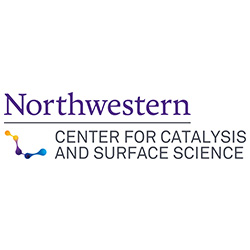
Center for Catalysis and Surface Science (CCSS) Monthly Meeting
Friday, April 5, 2024 | Sachtler Lecture
Please join the Center for Catalysis in the Technological Institute's J wing atrium post-lecture to celebrate Professor Harold Kung's retirement.
Food and drink will be provided | Register here for in-person attendance | Join remotely
Lecturer: Harold Kung, Walter P. Murphy Professor of Chemical and Biological Engineering, Northwestern University
Title: Protons and Electrons in Heterogeneous Catalysis
Abstract: The importance of protons in heterogeneous catalysis is well recognized, especially in zeolite acid catalysis. Recent work suggests that without solvation stabilization, the zeolite proton is rather inactive in reactions such as methanol dehydration to dimethyl ether, and the stability of solvated protonated surface species is critical to the observed activity. This offers the opportunity to tune the reactivity of the zeolite proton by solvation. Indeed, this can be achieved using different coadsorbates with the observation that the reactivity follows a Hammett type correlation with the coadsorbate proton affinity. The observation also implies that the reaction mechanism follows a pathway in which the zeolite proton is always solvated in the catalytic cycle, which is confirmed using isotopic labelling experiments. This may have implications on zeolite-catalyzed hydrocarbon conversion reactions.
Unlike electrochemistry, the mechanism of gas phase heterogeneous catalytic reactions hardly invokes electron exchange between an adsorbate and the solid catalyst. Such exchange becomes more plausible for reactions in an aqueous phase, which might involve ionic reactants and products and hydration stabilization of ions. However, since the overall reaction does not involve net electron transfer across the solid-liquid interface, the way in which an electron-transfer step affects the reaction kinetics is not trivial. We explored this question for the gold-catalyzed selective oxidation of glycerol using O2 in a basic medium in which H2O2 is produced stoichiometrically as a product. In reaction rate measurements using different pH’s and glycerol concentrations, we observed that there is a systematic variation of the open-cell potential of the Au metal with the reaction rate that suggests a potential-dependent activation barrier of the rate-limiting, hydrogen-abstraction step. A reaction mechanism is proposed to explain this observation, providing an example of the involvement of electron transfer in a heterogeneous catalytic reaction.
About the Wolfgang M. H. Sachtler Lecture
A member of Northwestern’s faculty since 1983, Wolfgang M. H. Sachtler was internationally known for his scientific and technical contributions to the field of heterogeneous catalysis, an essential technology for the production of fuels and chemicals, as well as pollution control. He was a member of the Royal Netherland Academy, the Vice President of the International Congress in Catalysis, and a member of the editorial boards of many major catalysis publications.
Past Wolfgang M. H. Sachtler Lecturers include:
April 5, 2024: Harold H. Kung, Northwestern University
November 12, 2021: Peter C. Stair, Northwestern University
December 6, 2019: Hai-Ying Chen, Johnson Matthey
September 7, 2017: Enrique Iglesia, University of California-Berkeley (2004 Ipatieff Lecturer, 2005 Burwell Award recipient)
September 7, 2017: Charles T. Campbell, University of Washington (2010 Ipatieff Lecturer, 2013 Burwell Award recipient)
The Center for Catalysis and Surface Science (CCSS) monthly meetings host speakers, as well as provide tutorials, research updates and facilitate team collaboration.
The mission of the Center for Catalysis and Surface Science (CCSS) is to promote interdisciplinary research fundamental to the discovery, synthesis, and understanding of catalysts and catalytic reactions essential to modern society. As a part of the Paula M. Trienens Institute for Sustainability and Energy, CCSS applies fundamental advances in catalysis science towards applications in alternative fuels, abatement of harmful emissions, resource recovery concepts, new processing routes, and many other strategies towards making chemicals more sustainable.
Audience
- Faculty/Staff
- Post Docs/Docs
- Graduate Students